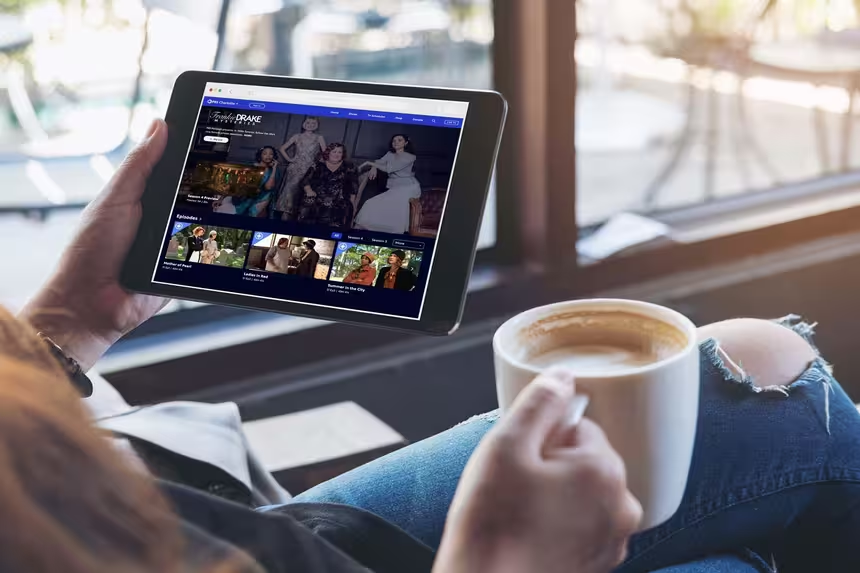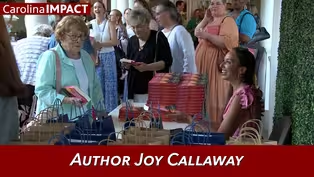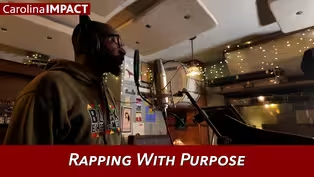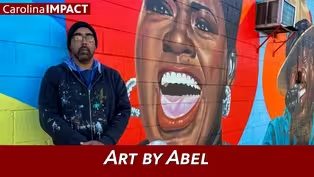
The Pearl of Progress: Teaching, Healing, and Staying in Charlotte | Carolina Impact
Clip: Season 13 Episode 1303 | 6m 19sVideo has Closed Captions
New medical school, residency expansion aim to keep more doctors in Charlotte.
Charlotte is tackling its doctor shortage with a new Wake Med Teachers College at The Pearl and Novant Health’s expansion of residency programs. The initiatives focus on training medical students through problem-based learning, cutting-edge tech, and community service while creating more local residency slots to keep young doctors in Charlotte, serving the communities where they train.
Problems playing video? | Closed Captioning Feedback
Problems playing video? | Closed Captioning Feedback
Carolina Impact is a local public television program presented by PBS Charlotte

The Pearl of Progress: Teaching, Healing, and Staying in Charlotte | Carolina Impact
Clip: Season 13 Episode 1303 | 6m 19sVideo has Closed Captions
Charlotte is tackling its doctor shortage with a new Wake Med Teachers College at The Pearl and Novant Health’s expansion of residency programs. The initiatives focus on training medical students through problem-based learning, cutting-edge tech, and community service while creating more local residency slots to keep young doctors in Charlotte, serving the communities where they train.
Problems playing video? | Closed Captioning Feedback
How to Watch Carolina Impact
Carolina Impact is available to stream on pbs.org and the free PBS App, available on iPhone, Apple TV, Android TV, Android smartphones, Amazon Fire TV, Amazon Fire Tablet, Roku, Samsung Smart TV, and Vizio.

Introducing PBS Charlotte Passport
Now you can stream more of your favorite PBS shows including Masterpiece, NOVA, Nature, Great British Baking Show and many more — online and in the PBS Video app.Providing Support for PBS.org
Learn Moreabout PBS online sponsorshipCharlotte's facing a growing doctor shortage.
But two major players are taking it head on.
Wake Med's new Charlotte Medical School, and Novant Health's expanded residency programs are creating a pipeline to keep more physicians here.
"Carolina Impact's" Chris Clark gives us a look at how they're doing it, with some of the most innovative training tools in medicine.
(screen whooshing) - [Chris] Think of the healthcare system as a patient.
Right now, they're running a fever.
The cause?
It's a shortage of doctors, with the condition only getting worse.
In Charlotte, the outlook is especially concerning, as demand for care rises faster than the supply of physicians.
- Nationwide, there's up to 100,000 physician shortage, by 2030.
In North Carolina, about 7,000 physicians short, about 1,800 primary care physicians short, by 2030.
This is a gap that we need to meet absolutely.
- [Chris] Charlotte's healthcare system faced a troubling diagnosis.
Rising demand for doctors, but no medical school to train them.
As the largest US city without a four-year program, the outlook seemed bleak.
Yet beneath the surface, the groundwork for medical education was already in place.
- The infrastructure was set up to do phenomenal medical education here.
Residency programs have been here for over three decades.
Medical student training in the clinical spaces has been here for over a decade.
- [Chris] It just wasn't all together.
So Wake Forest brought everything under one roof, by building The Pearl.
The name honors Charlotte's historic Brooklyn neighborhood, and like the gym, it symbolizes resilience, healing, and the city's commitment to innovation and renewal.
- And I remember my dad, he always travels down 77, and he was just in there from the beginning like, "Oh, they're constructing it.
I can see you being there."
- And that first conversation was a dream big type of conversation is, what is medical training?
What does medical care look like in 20 years?
Let's build a space and a school and a program that is really forward thinking in that.
- [Chris] They started by instituting problem-based learning.
Instead of sitting through hours of lectures, students dive into real world cases, and it pushes them to think like physicians from the start.
- I had a taste of that during my grad school program.
We had patient cases, and I realized that's just a better way of learning because it's very interactive.
- [Chris] They're not just putting up new walls.
They're weaving in cutting-edge technology to reimagine how future doctors are trained, and how they'll respond to, and care for patients in a changing world.
- In the donor laboratory, we have really detailed dissections that have been completed by professional dissectors that show the intricacies of the cardiovascular system.
And then that's coupled with, and beautifully complemented by this virtual anatomy laboratory.
- [Chris] These giant iPads bring the human body to life in 3D.
Just like NASCAR drivers run virtual laps before hitting the track, medical students can test, practice, and problem solve here, working out the challenges before treating real patients face-to-face.
- I can build a person, I can dissect away a person, I can rotate it around.
And then I really love the cross-sectional exposure for students, which is something that medical students really need to learn, but sometimes struggle with.
- That allows the type of repetition and standardization that just ingrains this knowledge and these skills into the students.
So last day of med school, students are ready for that first day of residency.
- [Chris] And speaking of residency, (sledgehammer banging) Novant Health Presbyterian Medical Center is making room to train more physicians by expanding its residency programs with new opportunities and key specialties.
- General surgery, internal medicine, OB/GYN.
And we had the opportunity to add in a neurology residency, which we desperately need in the city.
- [Chris] Nationally, about half of doctors stay where they complete their residency.
In Charlotte, the number jumps up to 75%.
It's a powerful sign of how training here connects physicians to the community, the hospitals, and the patients they'll serve from day one.
- You've got a resident that trains in your hospital, they know all your consultants, they know your medical record, they know your patients.
And then that resident transitions to a clinic, or a hospital in the region that they trained in.
There's no startup time.
- [Chris] And it isn't left to chance.
Wake weaves community service into the curriculum itself, shaping students from day one to see medicine not just as treating patients, but as investing back into the people and neighborhoods around them.
- We select our students to have that community focus.
So if you speak to each and every one of our students, you'll find down to a person, they are passionately committed to serving our community, and ensuring that the resources that are invested in them get reinvested into our community.
- [Chris] For the very first class of students, that mission is personal.
They see Charlotte not just as the place to train, but the community they hope to heal.
And for one student, those roots run especially deep.
- I'm super excited.
For starters, I'm from Charlotte, North Carolina.
I was born and raised here.
And my first, I guess, you can say my medical journey started at CMC Main.
What I'm looking forward to is staying here, and kind of starting to build the community now.
- Now Wake Med currently has 48 students this year.
And over the next five years, what they wanna do is increase that to about 98 per class.
Now you combine that with their Winston campus, and they're ultimately looking to graduating 250 per year.
- If I can just get to 150 residents, I think they can do about a million visits a year.
And to me, that's the goal.
- The school's activity, the training and the education, the research and the innovation within an ecosystem where also the healthcare delivery is here.
So Atrium Health, as well as other companies coming to be in this area, it's really exciting what's happening in the Pearl District.
- [Chris] By growing their own doctors, Charlotte's not just fighting the shortage, it's securing a healthier future for the city, and the region.
(bright music) For "Carolina Impact," I'm Chris Clark.
Author Joy Callaway | Carolina Impact
Video has Closed Captions
Clip: S13 Ep1303 | 7m 5s | Local author Joy Callaway perseveres to become a best selling author. (7m 5s)
Rapping With Purpose | Carolina Impact
Video has Closed Captions
Clip: S13 Ep1303 | 6m 42s | A local man turns his struggle with depression into rap music that inspires others. (6m 42s)
Video has Closed Captions
Clip: S13 Ep1303 | 4m 20s | A mural artist transforms walls into vibrant stories of history for future generations. (4m 20s)
September 23, 2025 Preview | Carolina Impact
Preview: S13 Ep1303 | 30s | The Pearl of Progress; Rapping With Purpose; Art by Abel; & Author Joy Callaway. (30s)
Providing Support for PBS.org
Learn Moreabout PBS online sponsorship
- News and Public Affairs

Top journalists deliver compelling original analysis of the hour's headlines.

- News and Public Affairs

FRONTLINE is investigative journalism that questions, explains and changes our world.












Support for PBS provided by:
Carolina Impact is a local public television program presented by PBS Charlotte



